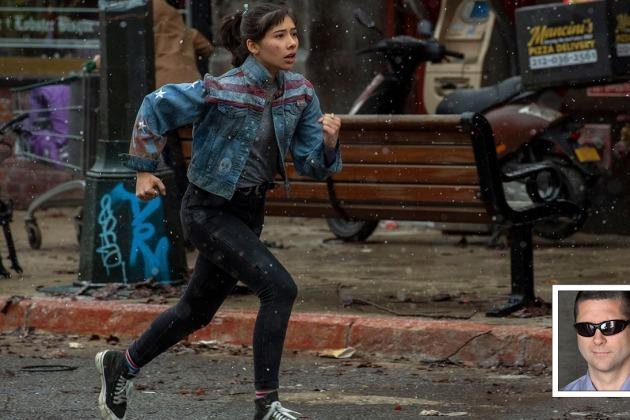
When director Sam Raimi’s Doctor Strange in the Multiverse of Madness arrives in theaters on May 5, audiences will meet America Chavez, the Marvel comic book character brought to life by young actor Xochitl Gomez. Ahead of its release, the fan-favorite hero’s addition has already received praise, with her inclusion seen as a win for representation, as she is the rare Latina superhero in the Marvel Cinematic Universe. The film will also acknowledge the character is gay, as she is in the comics, according to sources.
For comic book writer Joe Casey, seeing Chavez soar to new heights is bittersweet. Casey is proud of his work on America Chavez and what she represents. Yet, like many comic book writers before him, Casey feels a tinge of regret watching his creation take off without being meaningfully compensated for it. Casey has not received payment for America Chavez, outside the page rates he got when working for Marvel as a writer, when he and artist Nick Dragotta introduced the character in 2011. (Casey rejected what he describes as a “pittance” of an offer ahead of her Multiverse of Madness appearance.)
More from The Hollywood Reporter
Now, as Casey speaks out for the first time about his compensation, he is cautious not to sound aggrieved. The writer says he hopes going public will help other creators receive better terms when their work is turned into films, streaming series and action figures.
“The fact is Marvel owns America Chavez. That’s not in dispute on any level, but there are still systemic flaws in the way that creators are neither respected nor rewarded,” Casey tells The Hollywood Reporter.
Marvel publishing declined to comment, noting it does not speak out on individual creator agreements. During his time at Marvel, Casey never signed any paperwork regarding the character, though he understood Marvel owned anything he created there.
Casey’s work at Marvel dates back to the late 1990s, with credits including titles starring the X-Men, The Hulk, Iron Man and the Avengers. He has since earned success as one of the creators of the popular Ben 10 animated franchise, which gave him firsthand knowledge of how even the smallest amount of profit participation can add up to significant sums for creators thanks to merchandising and licensing deals. Members of his entertainment company, Man of Action, also negotiated with Marvel for the 2014 Disney animated film Big Hero 6, and received more favorable terms, which as Casey notes, shows Marvel can make these agreements sweeter for creators, should it choose.
Several years ago, when Casey learned Marvel intended to include America Chavez in the Doctor Strange sequel, he contacted the publisher to request paperwork that would also cover her previous appearances in animated TV episodes and video games.
Marvel publishing sent over a special character agreement for him to sign that included a cash offering. Casey ultimately declined to sign the special character agreement, and his lawyers expressed his dissatisfaction with the offer. Though Casey declined to say how much Marvel offered, the sums for other creator agreements is said to be in the $5,000 range, though a source on the Marvel side disputes that figure, saying they are generally higher. Marvel is not legally obligated to pay creators when their work is adapted, however it is customary for them to invite creators to movie premieres and give them cash compensation for appearances.
To date, Casey has not received a counter offer, though the Marvel source notes that conversations are ongoing. The writer, however, feels the company is stonewalling him. He also is frustrated that there was no transparency as to how Marvel arrived at the offer number.
“Marvel has paid me nothing for America Chavez, not only for appearing in the Doctor Strange sequel, but in numerous animated TV episodes, for the numerous action figures they’ve made of her, for video games she’s appeared in,” says Casey. “They seem to be fine with that.”
The issue of creator pay has been talked about in comic book circles for decades, dating back to when Superman creators Jerry Siegel and Joe Shuster sold the character for $130 in 1938. The late, legendary artist Jack Kirby was vocal about his own financial mistreatment by Marvel, despite co-creating much of its universe with Stan Lee.
In recent years, creator Jim Starlin went public with his pay grievances and ultimately received a better deal from Marvel for the use of the villain Thanos, who was at the center of Avengers: Infinity War and Avengers: Endgame, two of the biggest films of all time. And last year, star writer Ed Brubaker shared his dissatisfaction for his pay for co-creating The Winter Soldier, the character played by Sebastian Stan in billion dollar film franchises and the Disney+ series The Falcon and the Winter Soldier.
Rival publisher DC is generally said to compensate creators more when their work is adapted for the screen. As former DC president and publisher Paul Levitz noted to THR last year of his philosophy: “Christian Bale liked looking at [Batman artist] Tim Sale’s work before he would go out and strike a pose … I’m not sure how you value that. But when you have a movie that is as successful as Batman Begins or Dark Knight, it says that there’s something there. And you should say thank you in some fashion.”
Casey was well aware of the history of comics and aggrieved creators when he worked at Marvel, and went into it with open eyes. He resolved not to create characters for Marvel. Still, over his years, he couldn’t resist creating a few for the publisher, including America Chavez.
“For me, it’s not about money. It’s not even about the respect. I would never expect to be respected by a corporation,” says Casey. “If I’m in a position where I can afford not to take their insult of an offer, and be able to talk about it, maybe the next guy — where that kind of money could change their life — would get a fair shot of receiving that money.”
It is unknown where America Chavez will end up next, but it’s safe to say there’s much more in her Marvel Studios future. For a time, she was even considered for a part in Spider-Man: No Way Home, in which she would have played the sorcerer’s apprentice type role that ultimately went to Ned (Jacob Batalon), according to a knowledgeable source. No Way Home, which stands as the No. 6 movie of all time globally, was initially supposed to open after the Doctor Strange sequel and so her No Way Home part was cut.
Now, she’s poised to fight side by side with Benedict Cumberbatch in his latest appearance as Doctor Strange. As for Casey, he hopes speaking up might help change things on a systemic level at Marvel, which he wishes would be transparent for how it arrives at creator compensation.
Says the writer: “I’m a happy guy. I’m not disgruntled. I’m not bitter. Because I know this is how this goes. I also know, this is how you change things, by talking about it.”
Best of The Hollywood Reporter




